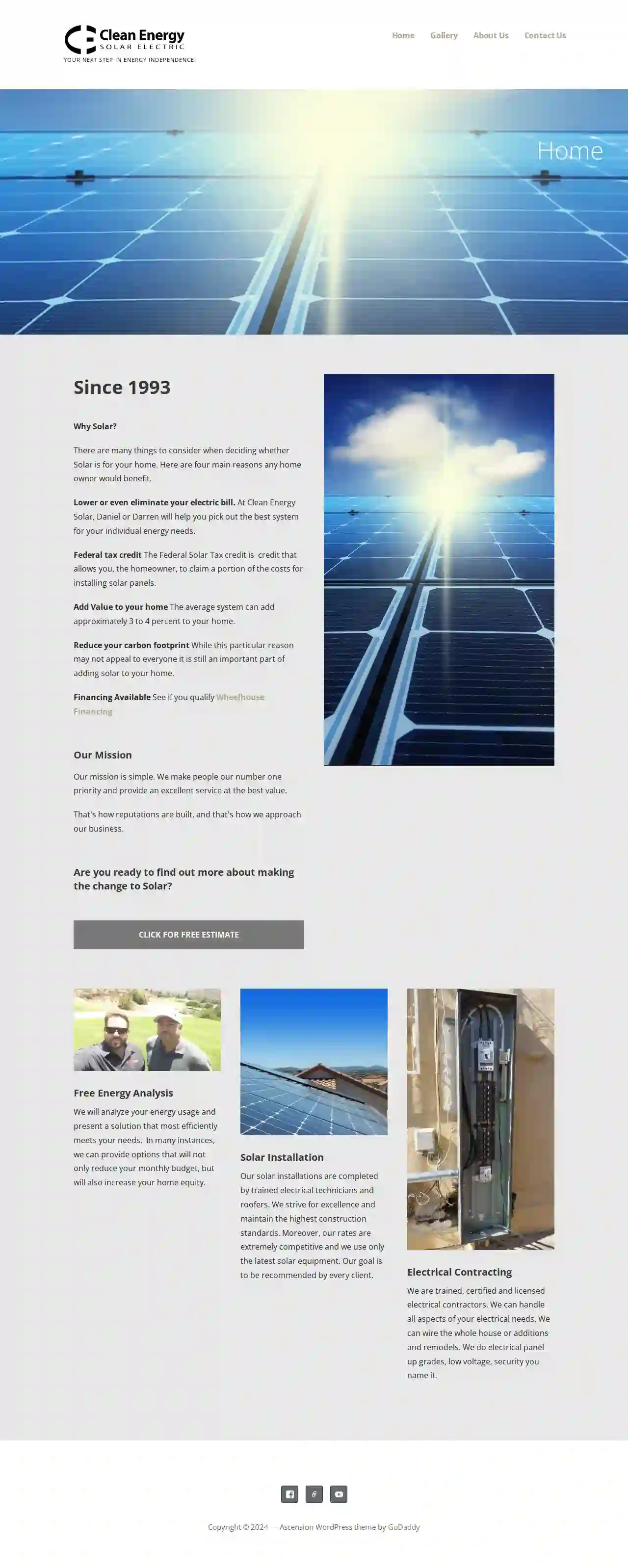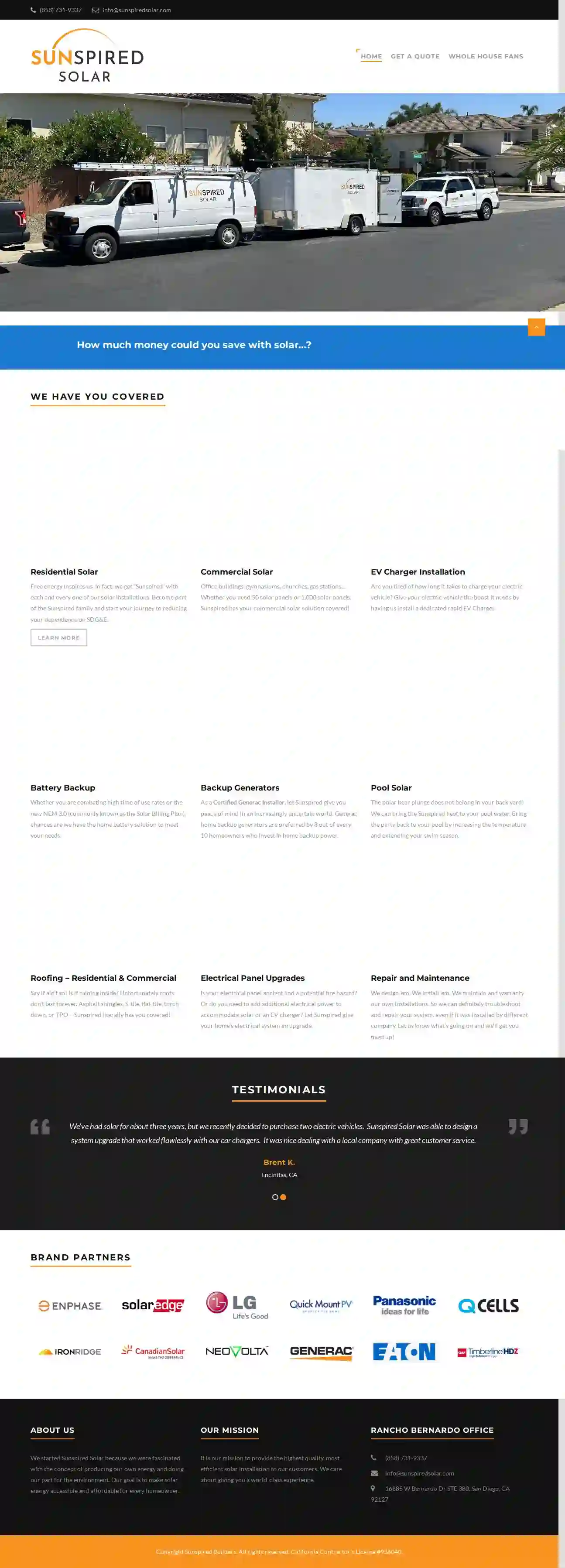Solar Installers Clayton
Top Solar Panels For Homes in Clayton
Receive 3 FREE Solar Installation Companies quotes for your project today! Compare profiles, reviews, accreditations, portfolio, etc... and choose the best service.

SOORYA unlimited
14 reviews1505 W Alton Ave, Santa Ana, 92704, USSoorya Unlimited is a developer of commercial energy projects, focusing on building new energy projects where renewable energy policies are favorable. The company comprises a team of Electrical Engineers and Management Professionals with combined experience of over 50 years in the industry. Soorya Unlimited believes in a paradigm shift towards clean, green, renewable energy and seeks to benefit customers from these trends.
- Services
- Why Us?
- Accreditations
- Our Team
- Testimonials
- Gallery
Get Quote
Clean Energy Solar
Vista, USClean Energy Solar is a company that has been in operation since 1993, focusing on providing solar energy solutions to homeowners. Their mission is to prioritize people and provide excellent service at the best value. They offer free energy analysis to help homeowners understand their energy usage and present solutions that can reduce monthly budgets and increase home equity. Their services include solar installation, electrical contracting, and more.
- Services
- Why Us?
- Gallery
Get Quote
Univercity Solar
55 reviews242 E Airport Dr, San Bernardino, 92408, USUniverCity Solar is a leading provider of solar solutions, offering both residential and commercial services. They are dedicated to helping individuals and businesses harness renewable energy and reduce operating costs. Their team of experts ensures a seamless and hassle-free experience from start to finish.
- Services
- Why Us?
- Accreditations
- Our Team
- Testimonials
- Gallery
Get Quote
SolarGraham
515 reviews123 Solar Way, Suite 101, Murrieta, 92562, USSolarGraham is a family-owned and operated solar installation and repair service for homes and businesses in Southern California. They offer the best equipment and prices on the market, with a commitment to honesty, integrity, and customer satisfaction. Their services include solar panel electric/PV system installation, repair, off-grid solar system services, grid-tied solar system services, ground-mounted system services, inverter services, and solar panel cleaning. They specialize in installations and replacements, with a focus on quality work and commitment to outstanding results.
- Services
- Why Us?
- Accreditations
- Our Team
- Testimonials
- Gallery
Get Quote
Sunspired Solar
54 reviews16885 W Bernardo Dr STE 380, San Diego, 92127, USSunspired Solar is a local business that specializes in providing high-quality solar installations to homeowners and businesses. They aim to make solar energy accessible and affordable for everyone. Their services include residential solar, commercial solar, EV charger installation, battery backup, backup generators, pool solar, roofing, electrical panel upgrades, and repair and maintenance. They have partnerships with brands such as Enphase, Solar Edge, LG, and more.
- Services
- Why Us?
- Accreditations
- Testimonials
- Gallery
Get Quote
Plug It In Solar
4.821 reviews15013 Califa St, Van Nuys, CA 91411, 91411, USPlug It In Solar is a solar company, that provides solar panel installations while leading the way to greener & cleaner future with solar energy! We provide our customers with reliable and efficient service while striving to educate homeowners and business owners about the economic and environmental impact of installing solar panels.
- Services
- Why Us?
- Accreditations
- Gallery
Get Quote
Cira Energy Inc
11 reviews1440 South State College, Suite 4B, Anaheim, 92806, USCira Energy is a family-run solar company based in California, dedicated to providing clean energy solutions through solar power. With over 30 years of combined experience in solar roof systems, roofing, and metal roofing, Cira Energy offers highly competitive prices for the quality they provide. Their mission is to help customers reduce or eliminate their utility bills by installing solar roof systems. As a sister company under Western Roofing Systems, Cira Energy ensures that their solar roofing and roofing professionals are well-versed in the installation of solar roof systems, making them a reliable choice for those seeking solar energy solutions in Southern California.
- Services
- Why Us?
- Accreditations
- Our Team
- Testimonials
- Gallery
Get Quote
EnergyPal
4.98005 Financial Dr Suite 323, Brampton, ON, L6Y 6A1, USEnergyPal is an unbiased service that assists in shopping for the best-fit energy solution for your home. They listen, educate, and advise on top-quality equipment and warranties.
- Services
- Why Us?
- Accreditations
- Our Team
- Testimonials
- Gallery
Get Quote
Powered By The Sun
51 reviewsThousand Oaks, USAbout usReviewsService AreasWhy SolarPricing PlansProjectsContact usTAKE YOUR POWER BACKGet ahead of your energy needs with cutting-edge solar and home backup.Get a quote14+YEARS EXPERIENCEAbout UsA nationwide Solar BrokerOffering homeowners the best option in solar. From Solar Panels, Inverters, and Storage Solutions. We customize every quote for your needs.1. The best Panels and Storage optionsSolar Panels from SunPower, Q-Cell, REC, Canadian Solar, and more. Best Battery options from SunPower SunVault, EnPhase, FranklineHW, Tesla Powerwall, and SolarEdge.READ MORE2. Smartest TechnologyAn ecosystem built give you the power at your finger tips. Apps that allows you to control your entire system. Along with our newest partner SPAN, taking the electric panel to a whole new level.READ MORE3. Payment Solutions to fix your needsWe listen, and customize payment needs to what you want, not what benefits us more. With $0 out of pocket options, to options that will not show on your credit. We have everything you need.READ MORE4. Our GuaranteeWith our many partners we have warranties unlike anyone in the industry. All to protect you on your investment, and keep it running for 25+ years. We even offer a 25 year warranty on batteries as well.READ MOREHelping Homeowners break the limits of traditional energyReplace your costly, unreliable grid power with solar energy and backup batteryContact UsWHAT OUR CLIENTS SAYStevenThousand Oaks, CAPowered By The Sun makes things so easy. Puts in the panels, batteries, and all the permitting. We pay less than what SCE would charge us and we are protected from blackouts.BiancaCorona, CAPowered By the Sun was the best solar company to work for. Kerry took the time to go over the options and show the difference between backup battery and non backup. I am glad he showed both options it allowed us to make the best decision.EddieSan Diego, CAPowered By The Sun took time to look over my consumptions and break it down on how and when I was using power. Other companies just asked for one bill. Kerry took the time to explain the why behind how he designed the system. Other did not. very helpful in knowing I made the correct decision, MichaelGoodyear, AZSuper easy and simple. Kerry and Powered by The Sun took time to listen to my concerns, and allow me to have input on the design of the system. It felt like I was choosing unlike other experiences.JasonHonolulu, HIIt was great knowing that we needed to go solar with the high cost of power to have Kerry and Powered By The Sun walk me through all the options. I never felt like he was only trying to sell me something, but allow me to find the solution that make me feel I got the proper system. We love our blackout protection and not having to worry about another power outage again.ColtonTampa Bay, FLMy Brother in New Jersey worked with Kerry and Powered By The Sun. Since he had a great experience and that they are a Nationwide company I was a little worried that Kerry would not know this market. I was wrong he was able to answer all my questions better than some of the local sales people I have spoken too, and he is in California. I will be referring more business to him.
- Services
- Why Us?
- Our Team
- Testimonials
- Gallery
Get Quote
Solar Scooters - Best Rated Electric Scooters In USA
4.627 reviews744 W Avenue L6, Lancaster, 93534, USSolar Scooters is a leading brand in the electric scooter industry, known for its innovative products and commitment to a greener future. Our dedicated engineers continuously push the boundaries of technology, from electro-luminescent lights to revolutionary NFC displays. By choosing Solar, you invest in a high-quality product and join a movement towards a cleaner, more sustainable future.
- Services
- Why Us?
- Accreditations
- Our Team
- Testimonials
- Gallery
Get Quote
Over 4,210+ Solar Installers on our directory
Our solar pros operate in Clayton & surrounding areas!
SolarCompaniesHub has curated and vetted the Best Solar Businesses near Clayton. Find a trustworthy contractor today.
Frequently Asked Questions About Solar Installers
- System size (measured in kilowatts, or kW)
- Type of solar panels (monocrystalline, polycrystalline, thin-film)
- Roof complexity (pitch, size, obstructions)
- Labor costs in your area
- Available incentives and rebates
- System size
- Roof complexity
- Weather conditions
- Permitting and inspections
- Installer's schedule
- Your current energy usage
- The size of your solar system
- Your local electricity rates
- The amount of sunlight your panels receive
- Available net metering policies
What is the average cost of solar panel installation in USA?
Will solar panels work during cloudy days or at night?
How long does it take to install solar panels?
How much can I save on my electricity bill with solar panels?
What is the average cost of solar panel installation in USA?
- System size (measured in kilowatts, or kW)
- Type of solar panels (monocrystalline, polycrystalline, thin-film)
- Roof complexity (pitch, size, obstructions)
- Labor costs in your area
- Available incentives and rebates
Will solar panels work during cloudy days or at night?
How long does it take to install solar panels?
- System size
- Roof complexity
- Weather conditions
- Permitting and inspections
- Installer's schedule
How much can I save on my electricity bill with solar panels?
- Your current energy usage
- The size of your solar system
- Your local electricity rates
- The amount of sunlight your panels receive
- Available net metering policies